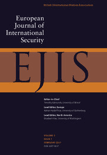
European Journal of International Security
Scope & Guideline
Unraveling the complexities of political and social security.
Introduction
Aims and Scopes
- International Security Dynamics:
The journal addresses the complexities of international security, including state interactions, military strategies, and geopolitical tensions, examining how these elements shape global peace and conflict. - Interdisciplinary Approaches to Security Studies:
It promotes interdisciplinary research, integrating perspectives from political science, sociology, cultural studies, and technology, thereby enriching the discourse on security. - Gender and Security:
A consistent focus on gender-related issues in security contexts, exploring how gender dynamics influence conflict, military strategies, and peace processes. - Emerging Technologies and Security:
An exploration of how technological advancements, particularly in cybersecurity and military applications, are reshaping security paradigms and practices. - Humanitarian and Ethical Dimensions of Security:
The journal emphasizes the humanitarian aspects of security, including the ethical implications of military interventions, refugee protection, and the human cost of conflict. - Securitisation Theory:
It engages deeply with securitisation theory, analyzing how issues are framed as security threats and the implications of this framing for policy and practice.
Trending and Emerging
- Cybersecurity and Digital Warfare:
There is a significant uptick in research related to cybersecurity, digital threats, and the implications of technology on national and international security. - Populism and Security:
Emerging studies critically analyze the intersection of populism and security, particularly how populist movements influence national security policies and public perceptions. - Gendered Perspectives in Security:
An increasing focus on gendered analyses of security, particularly regarding women's roles in conflict, military service, and peacebuilding initiatives. - Climate Change and Security:
Research is emerging around the security implications of climate change, exploring how environmental factors contribute to conflict and humanitarian crises. - Non-Traditional Security Threats:
A growing interest in non-traditional security threats, such as health pandemics, migration crises, and biosecurity, reflects a broader understanding of what constitutes security in contemporary contexts. - Indigenous and Alternative Security Frameworks:
The journal is beginning to embrace alternative security narratives, including Indigenous approaches to security and community-based practices, indicating a shift towards more inclusive frameworks.
Declining or Waning
- Traditional Military Strategies:
There seems to be a waning focus on conventional military strategies and warfare, as the journal increasingly prioritizes discussions around hybrid warfare and non-traditional security threats. - State-Centric Security Models:
The emphasis on state-centric security frameworks is declining, with more attention directed towards transnational issues, non-state actors, and global governance. - Cold War Paradigms:
Research grounded in Cold War analogies or frameworks is becoming less frequent, as contemporary security challenges require new theoretical constructs and analyses. - Nuclear Deterrence Theories:
There is a noticeable decrease in articles specifically focused on nuclear deterrence strategies, as discussions shift towards broader security concepts such as resilience and cooperative security. - Regional Security Alliances:
The focus on traditional regional security alliances appears to be diminishing, with increasing interest in non-aligned movements and informal coalitions.
Similar Journals
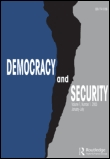
Democracy & Security
Bridging Democracy with Global Security InsightsDemocracy & Security is a leading journal published by Routledge Journals, Taylor & Francis Ltd, dedicated to the exploration of the intricate relationship between democratic governance and security issues. With its ISSN 1741-9166 and E-ISSN 1555-5860, this journal serves as a critical platform for scholars and professionals to engage with theoretical and empirical research that spans the fields of Political Science, International Relations, Sociology, and Safety Research. Ranked in the Q3 and Q4 quartiles across its categories, it consistently delivers impactful insights, evidenced by its respectable Scopus Ranks and relevant percentile standings. The journal reflects the urgent need for interdisciplinary dialogue amid growing global security challenges, making it a vital resource for those invested in understanding and enhancing democratic security frameworks. As the journal converges from 2010 to 2024, it continues to welcome contributions that address contemporary issues, thereby fostering a deeper understanding among researchers, professionals, and students alike.
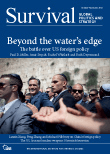
SURVIVAL
Exploring Interdisciplinary Insights for Global ChallengesSURVIVAL is a leading academic journal published by Routledge Journals, Taylor & Francis Ltd, focusing on the critical intersection of political science, international relations, and sociology. Since its inception in 1959, this esteemed journal has provided a platform for rigorous research and insightful discussions that address pressing global challenges. With an impressive impact factor and a Q2 ranking in both Political Science and Sociology categories, SURVIVAL is recognized for its high-quality, peer-reviewed articles that appeal to researchers, professionals, and students alike. The journal strives to promote interdisciplinary dialogue and foster a deeper understanding of survival in contemporary societies, making it indispensable for those who seek to navigate and influence the complex political landscapes of our time.
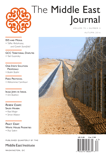
MIDDLE EAST JOURNAL
Unveiling Insights into a Dynamic RegionThe Middle East Journal, published by the esteemed Middle East Institute, serves as a vital platform for scholarly discourse on the complexities of the Middle East, encompassing rich analyses in the fields of Sociology, Political Science, and Geography. With a legacy dating back to 1976, this journal continues to shape contemporary dialogues, offering rigorous research and insights that influence policy-making and academic studies alike. Academic readers will note its Scopus rankings, positioning it within the lower quartiles of Geography, Planning and Development and Sociology and Political Science, reflecting an opportunity for growth and increased visibility within these fields. Although the journal is not open access, it remains an essential resource for those aiming to enhance their understanding of the historical and current dynamics of the Middle East. The Middle East Journal stands as a testament to the region's complex socio-political landscape and offers a comprehensive lens for both established scholars and aspiring researchers.

KOREAN JOURNAL OF DEFENSE ANALYSIS
Navigating the landscape of international defense dynamics.Korean Journal of Defense Analysis (KJDA) is a pivotal academic publication committed to advancing research in the realms of Political Science, International Relations, and Safety Research. Established by the Korea Institute for Defense Analyses (KIDA) in South Korea, this journal serves as a vital platform for scholars, practitioners, and policymakers interested in defense strategies and security studies. With an ISSN of 1016-3271 and an E-ISSN of 1941-4641, KJDA offers rigorous peer-reviewed articles that contribute to the theoretical and empirical understanding of defense and safety issues. As of 2023, it holds a reputable standing within various categories, ranked in the Q3 and Q4 quartiles, reflecting its significance and influence in the field. Although not an Open Access journal, KJDA provides essential insights spanning from 1996 through to 2024, attracting a diverse readership ranging from researchers to students eager to explore contemporary defense analysis and its implications on global security dynamics. With a dedicated commitment to quality and relevance, KJDA remains an indispensable resource in the ongoing discourse surrounding defense and safety.
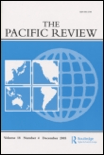
PACIFIC REVIEW
Illuminating pressing social and political issues with academic rigor.PACIFIC REVIEW is a prestigious journal published by Routledge Journals, Taylor & Francis Ltd, dedicated to advancing the fields of geography, planning, and sociology. With an impressive impact factor and recognized as a Q1 journal in both Geography and Sociology categories, PACIFIC REVIEW ranks among the top journals in its domain, sitting at the 84th percentile for Sociology and Political Science and the 76th percentile for Geography, Planning and Development according to Scopus rankings. The journal aims to foster critical discussions and disseminate innovative research that addresses pressing social, geographical, and political issues facing the Pacific region. Published since 1988, it benefits from a rich history of scholarship and aims to bridge knowledge gaps through robust academic contributions. Researchers, professionals, and students interested in interdisciplinary studies will find valuable insights and cutting-edge research within its pages. While currently not an open-access publication, PACIFIC REVIEW provides essential literature to support academic and policy developments in these vital fields.

RUSI Journal
Advancing the discourse on global security and strategy.RUSI Journal, published by Routledge Journals, Taylor & Francis Ltd, is a prestigious platform dedicated to advancing scholarship in the fields of Political Science and International Relations. With an ISSN of 0307-1847 and an E-ISSN of 1744-0378, this journal significantly contributes to the academic discourse, featuring original research, critical analyses, and essays that address contemporary security issues, strategic studies, and defense policy. Based in the United Kingdom, and operating since 1972, the journal has established a formidable reputation — achieving a Q3 ranking within its category in 2023, and positioning itself at the 57th percentile amongst over 700 peers in Scopus. Although it does not offer open access, the journal remains a vital resource for researchers, professionals, and students seeking to deepen their understanding of geopolitical dynamics and security challenges globally. With a commitment to rigorous scholarship and impactful insights, RUSI Journal continues to shape debates and influence policy within the international arena.
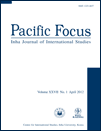
Pacific Focus
Connecting Scholars to the Heart of Pacific PoliticsPacific Focus is a renowned academic journal published by WILEY, focusing on the dynamic fields of Political Science and International Relations. Established in 1986, it has developed a reputation for disseminating innovative research and critical analysis pertinent to the geopolitical landscape of the Pacific region and beyond. With an impressive rank of #370/706 in Political Science and International Relations, notably achieving a Q2 category rating in 2023, it serves as a vital resource for scholars and practitioners alike. The journal also holds a respectable Q3 status in Sociology and Political Science, reflecting its broad interdisciplinary appeal. While currently not offering Open Access, Pacific Focus maintains a commitment to high-quality scholarship through rigorous peer-review processes. Researchers, professionals, and students will find it an essential platform for exploring contemporary issues, fostering academic dialogue, and contributing to the field's evolution.
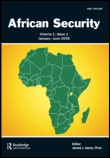
African Security
Illuminating complex security dynamics across the continent.African Security is a prestigious academic journal dedicated to advancing the discourse on security studies within the African context. Published by Routledge Journals, Taylor & Francis Ltd, it serves as a leading platform for researchers and practitioners interested in the complex political and security landscape of the African continent. With an impressive impact factor and recognized status as a Q1 journal in Political Science and International Relations, it ranks among the top resources for current research in the field, positioned in the 86th percentile for Political Science and 72nd percentile for Safety Research within their respective categories. Although the journal does not currently offer Open Access options, its rich content, ranging from theoretical frameworks to empirical studies, addresses critical issues in security, policy-making, and international relations. Since its inception in 2008 and continuing through 2024, African Security remains an essential resource for those seeking to deepen their understanding of security dynamics in Africa, making it invaluable to students, policymakers, and scholars alike.

Revista de Estudios en Seguridad Internacional-RESI
Exploring the Frontiers of Global SecurityRevista de Estudios en Seguridad Internacional (RESI) is a distinguished academic journal dedicated to the exploration and analysis of international security issues. Published by the University of Granada's Faculty of Political Science and Sociology, this journal has been on the forefront of critical security studies since its Open Access inception in 2015, providing a platform for researchers, practitioners, and students to share innovative ideas and scholarly work. With a focus on contemporary themes in international security, RESI encourages interdisciplinary dialogue and engagement, fostering a deeper understanding of global challenges. As a vital resource for those involved in political science and security studies, the journal aims to disseminate rigorous research that contributes to both academic scholarship and practical applications in policy-making. Researchers and professionals alike will find RESI an invaluable space for advancing their inquiries and sharing their findings with a global audience.
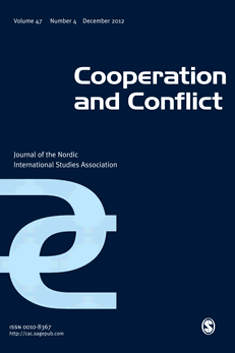
Cooperation and Conflict
Decoding the Interplay of Cooperation and ConflictCooperation and Conflict is a premier academic journal published by SAGE Publications Ltd that serves as a vital platform for research in the fields of development, political science, international relations, and social sciences. With an impressive impact factor and a prestigious Q1 ranking in multiple categories including Political Science and Development, this journal stands out for its rigorous peer-reviewed articles that explore the complexities of conflict and cooperation in various global contexts. Since its inception in 1965, the journal has remained dedicated to advancing scholarly discussion and providing insights into social dynamics, making it an essential resource for researchers, professionals, and students alike. Although it does not offer open access, its significant contributions to the field and high citation rates underscore its importance in understanding and addressing contemporary societal challenges. For those keen to delve into critical discussions and findings that shape our understanding of cooperation and conflict, this journal is an indispensable asset.